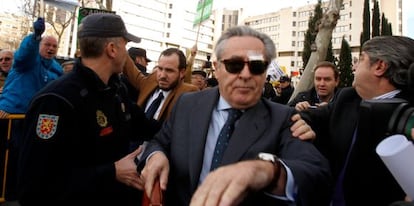Judge allows former Caja Madrid chief to keep his passport
Blesa hit by protestor’s placard as he leaves court

Former Caja Madrid chief Miguel Blesa got to keep his passport after testifying before a judge over the allegedly irregular purchase of the City National Bank of Florida by the lender he presided between 1996 and 2009.
But the good news for the once-powerful banker was offset by the tension outside the courthouse in Plaza de Castilla, where Blesa was awaited by a crowd of journalists and angry investors who lost their savings after buying preferred stock sold by Caja Madrid (among others) under misleading premises.
As people yelled out at him, a protest sign went flying through the air and hit Blesa in the face. Riot police escorted him to his car with difficulty.
The case currently under investigation involves the acquisition of the City National Bank of Florida by Caja Madrid on November 7, 2008. Blesa, who approved the purchase for over 1.12 billion dollars, is accused of having overpaid by more than 50 percent and of bypassing regional laws that required permission from the Madrid government for transactions worth more than five percent of the lender’s capital. The Bank of Spain had also expressed misgivings about the Florida bank’s solvency.
In 2010, the struggling Caja Madrid merged with six other savings banks to form Bankia, which was nationalized two years later to prevent bankruptcy. The original examining judge in the Florida purchase case, Elpidio José Silva, sent Blesa to preventive prison twice, only to have the Provincial Court of Madrid strike down the decision. Now Silva himself is being investigated for allegedly abusing his authority when he remanded Blesa the second time, when he was apprised of internal e-mails showing the executive's role in the acquisition.
The case has been taken up by a new judge, Juan Antonio Toro, who will determine whether Blesa incurred in criminal behavior when he approved the US transaction. Minutes of board meetings show that Blesa ignored petitions from board members to have an independent source provide an estimate of the Florida bank’s real value. “I consider it inopportune at the present time to have an investment bank come in to provide its valuation,” he told the board on April 14, 2008. Blesa also circumvented questions regarding whether “all necessary authorizations” had been requested to comply with regional legislation - which they had not.
On April 24, 2008, when the sales contract had already been approved and signed, Blesa refused to hand it over to Pablo Abejas, the chairman of the lender’s control commission. “The sale has not taken place and, consequentially, there is no sales contract,” he replied officially. Yet in internal e-mails that reached the former examining judge Silva, Blesa told his close aides: “I’m not going to send it to him” and that: “The control commission will never supervise the savings bank’s sales contracts. That is not its mission."
The internal e-mails, which EL PAÍS had access to and has partly published, show Blesa’s close relationship with the Popular Party and very particularly José María Aznar, who was prime minister between 1996 and 2004. Both men sat the public examination to become tax inspectors in 1976.
Miguel Bernard, a former leader of the extreme-right party Frente Nacional and now secretary general of the pressure group Manos Limpias, which has filed many complaints against corruption, said that he will seek preventive prison for Blesa. He also requested that the e-mail exchanges between Caja Madrid executives be added to the evidence in the investigation of the acquisition of the City National Bank of Florida.
“This will enable us to extract information about the dealings of Miguel Blesa in Caja Madrid,” said Bernard, who described the former banker as “the greatest predator in the Spanish financial system.”
Tu suscripción se está usando en otro dispositivo
¿Quieres añadir otro usuario a tu suscripción?
Si continúas leyendo en este dispositivo, no se podrá leer en el otro.
FlechaTu suscripción se está usando en otro dispositivo y solo puedes acceder a EL PAÍS desde un dispositivo a la vez.
Si quieres compartir tu cuenta, cambia tu suscripción a la modalidad Premium, así podrás añadir otro usuario. Cada uno accederá con su propia cuenta de email, lo que os permitirá personalizar vuestra experiencia en EL PAÍS.
En el caso de no saber quién está usando tu cuenta, te recomendamos cambiar tu contraseña aquí.
Si decides continuar compartiendo tu cuenta, este mensaje se mostrará en tu dispositivo y en el de la otra persona que está usando tu cuenta de forma indefinida, afectando a tu experiencia de lectura. Puedes consultar aquí los términos y condiciones de la suscripción digital.








































